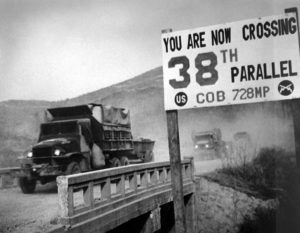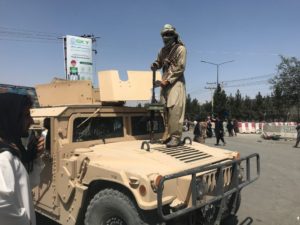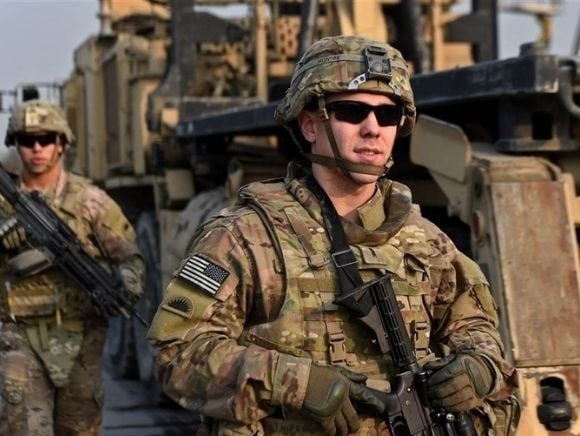The United States has been in armed combat frequently, more than any citizen would ever have wished, and U.S. military leadership has acquitted itself honorably in most cases. This cannot be said of the White House, Congress, and Pentagon decision-makers. In its coverage of America’s involvement in Afghanistan, Liberty Nation made the point that the current administration and the Pentagon have made a shambles of what had been claimed to be a measured, disciplined, and structured Afghanistan exit strategy.

(Photo by Interim Archives/Getty Images)
Throughout history, when the United States does not pursue an unambiguous, undeniable “win” in a conflict resulting in a vanquished enemy, the outcome seldom has worked out well for any semblance of lasting peace. History.com takes account of U.S. national security leadership’s missteps, miscalculations, and mistakes. For example, the Korean War. Hostilities started with the North Koreans invading the newly established Republic of Korea in the south of the peninsula. It ended in a stalemate among the United States, its U.N. allies, and North Korea, backstopped by China. That deadlock continues today and, in many ways, perpetuates a situation more dire than when intense fighting stopped in 1953: North Korea now has nuclear weapons, and China is a competitor on a global scale.
In most cases where the United States has engaged an enemy with no clear military objective, the result looks more like deadly whack-a-mole. For example, sending our marines into places like Lebanon in 1982, when a U.N. peacekeeping force failed in its mission, resulted a year later in the deaths of 262 Marines, America’s finest, and to no good end.
America’s horrendous experience in Somalia highlighted the failure of U.S. military and foreign policy leaders to understand that sending forces into harm’s way without a well-defined goal is a fool’s errand. After the heart-wrenching 1993 photographs and video footage of courageous Delta Force soldiers’ bodies being dragged through the filthy streets of Mogadishu, President Bill Clinton addressed the nation, saying, “We did not go to Somalia with a military purpose. We never wanted to kill anyone.”
This statement described the very heart of the problem: Then why did you send the military — with guns, armored personnel carriers, and attack helicopters — to engage an armed gang of vicious thugs and terrorists if it wasn’t to kill somebody? That misadventure got 18 U.S. soldiers killed and 84 wounded. Clinton then announced he was sending “1,700 additional Army troops and 104 additional armored vehicles” to Somalia — to not kill anyone.
Emblematic of the failure of U.S. national security policy and the employment of the military might without a clear objective was South Vietnam, at the cost of 58,000 American soldiers, sailors, and airmen. The painful resemblance between the end days of Saigon and what we saw in Kabul on Aug. 15 is well chronicled by Tim Donner in Liberty Nation’s account, “Kabul and Saigon: A Tale of Two Cities.”
From the fall of Saigon, fast-forward to Operation Iraqi Freedom and Operation Enduring Freedom. The first was a mission to destroy Saddam Hussein’s capability to manufacture and employ weapons of mass destruction, freeing Iraqis from a dictator who used poison gas on his own people. The latter was to reconstruct Afghanistan and enable the Afghan people to enjoy freedom and the democratic process. The Iraqi effort showed modest success in ridding the country of Hussein, but fighting has been almost continuous in one region or another. Operations in Afghanistan failed. The George W. Bush administration initiated the two invasions with noble and uncertain purposes. The Barack Obama administration’s fits and starts in both Iraq and Afghanistan, upon reflection, can best be described as feckless.

(Photo by STR/NurPhoto via Getty Images)
That brings us to the fall of Afghanistan. Most foreign policy wonks, Congress, national security and Pentagon leadership supported U.S. armed forces going into Afghanistan to rout and destroy Al Qaeda following the 9/11 attack on America. That was done with dispatch, and then attention turned to defeating the Taliban. As the Council on Foreign Relations explained in its report “The U.S. War in Afghanistan 1999-2021,” the end of the Taliban was its surrender of Kandahar.
In March 2002, a major U.S. ground assault, Operation Anaconda, crushed the 800 Al Qaeda remnants. At this point, the United States could have declared victory, supported the fledgling Afghan government with humanitarian aid, provided military trainers to bolster newly formed security forces, and brought home U.S. ground forces.
Instead, in April 2002, Bush pushed for the reconstruction of Afghanistan. In a speech at the Virginia Military Institute, he established the roadmap: “By helping to build an Afghanistan that is free from this evil and is a better place in which to live, we are working in the best traditions of George Marshall.” Comparing Afghanistan to rebuilding post-World War II 20th-century Europe was an inept comparison. The lesson for Americans is clear. When our nation’s leadership starts to talk about “nation-building” and making other countries “safe for democracy,” antennae should go up.
The United States does not do nation-building well. Instead, the “great experiment” called America should work as a model for struggling countries on “being safe for democracy.” But under no circumstances should U.S. armed forces be dispatched to reconstruct a failed nation. In each of the examples above, the common thread shows the abandonment of military objectives in favor of rehabilitating failed or failing governments and countries. To date, using U.S. soldiers, sailors, and airmen — trained to kill an enemy and break its weapons — to establish a society safe for democracy where none existed before has proved to be elusive.
The views expressed are those of the author and not of any other affiliation.
~
Read more from Dave Patterson.




